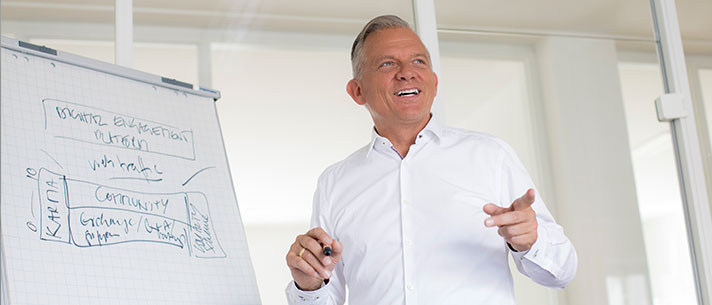To be successful means being open to new ideas, never standing still, and always reinventing oneself. For this reason, change and challenges are part of Fidor’s DNA. 2019 will be a particularly challenging year for the Fidor team that has successfully managed change on many occasions. This year promises to be a turning point.
Let us briefly look back: In 2016 BPCE, the second largest French banking group, took over the Fidor Group. With BPCE as a partner and on the basis of greater financial strength, the digital product offering of Fidor was to be expanded and international growth accelerated. At the same time, it was the aim of BPCE to take a decisive step into a technology-based future. A clear plan by and for two partners who, on paper, seemed perfectly matched and complementary: on the one hand the established and financially strong French banking group, and on the other the highly innovative, agile and technology-driven neo-bank with its headquarters in Munich. That was the plan.
Together, much has been achieved in the last two years. With around 950,000 registered community users and 380,000 account holders, the bank continues to show high-quality growth. Customer deposits are now at around 1.3 billion euros. To further strengthen earnings, the Digital Loan Factory and the Efficient Scale marketplace were founded, among other things. It must, however, be ungrudgingly acknowledged that in the same period others have – apparently – achieved more even though they started after Fidor Bank.
In the BtoB segment Fidor has been able to maintain its lead and significantly expand its business. The Fidor Group can show guaranteed sales of around 20 million euros for the next five years. There is also cross-selling potential with these existing customers of another 15 million euros for the same period. The attractiveness of the model is reflected in the current sales pipeline, which has a potential total contract value (TCV) of around 200 million euros for the next five years if current demand is fully converted into customers.
The BtoB segment is precisely the segment that no longer plays a strategic role for the majority shareholder since the change of leadership. In September 2018 after a strategy review we came to the logical decision that the two partners should go their separate ways.
For Fidor, this conscious decision offers numerous new and indeed exciting opportunities in an increasingly digitalizing financial world. The following examples show that we are well positioned for the future. Fidor BaaS Banking is focusing on the European BtoB market.
As part of the BaaS offer, Fidor Bank undertakes complete banking services (license, processes and platform) for its business customers (banks and non-banks) with all the necessary tools – from accounting and compliance to regulatory reporting, crediting and state-of-the-art payment transactions. Apple Pay was recently introduced as an innovative product and has already been taken up by initial customers such as O2 Banking. As the only banking infrastructure in the world, the in-house Fidor Operating System offers a customer engagement suite in the form of a community and a loyalty program.
The Dutch asset management bank van Lanschot is now the fifth major customer to go live on an fOS platform, following the Abu Dhabi Islamic Bank in the United Arab Emirates and Natixis in Algeria, among others. This proves that the fOS platform can be used internationally and can be connected to different core banking systems.
A future-oriented marketplace company was founded in the form of Efficient Scale. The purpose of this company is to scale up, simplify and deepen the cross-selling activities not only for Fidor Bank but also for all partners. Scalability is achieved through standardized onboarding of product partners and the white label capability of sales partners. In this way, B2B sales partners have the opportunity to create a tailor-made offering from a set of products for their own end customer base without having to worry about the complexity of the partner link.
On the basis of these and other innovative approaches of Fidor, 2019 will be about nothing less than finding the right partner for us.
Three elements are particularly important here. First, the technological backbone of Fidor must be maintained at a high level because the core business of the Fidor Group is “technology banking”. Each of the numerous awards that we win for our innovations, customer satisfaction and so on is confirmation of our achievements in the past. We must and will be faster than the market. Second, technology has to be lived, in other words both understood and consciously applied. And yet, particularly in the context of financial services, technology must never be a means to an end – because with good reason there needs to be respect and understanding for the regulatory systems and supervision. In short, the regulatory challenges of the banking business must be understood (to the full satisfaction of the supervisory authorities) and pursued, both qualitatively and quantitatively. And last but not least, growth is the order of the day.
Against this background we are now engaged in promising discussions with a number of potential partners. Each of these partners involves quite different options, and each is exciting. In addition to the above-mentioned criteria, it will also be important for the Fidor team to gain a clear understanding of the possibilities of “value generation”. This will inevitably lead to a situation in which as part of these discussions we will have to hone our concept and focus on our organization.
The Fidor story is far from finished. Fidor management is highly motivated to continue shaping the future of Fidor. In our eyes, the present situation represents an outstanding opportunity because we are ideally positioned and are working in a market which is calling more loudly than ever for digital solutions and which sees such solutions in a positive light.



